 |
|
|
|
|
|
Alexander the Great: Impressions of the Community and |
|
“There is and will be only one Alexander the Great in history,” said my late father, George, a WWII decorated POW. The handsome figure of a blonde, blue eyed youth on a black horse has mesmerized school age children for generations. Alexander the Great of Macedon spoke only Greek. He made the world of his time learn Greek so they could communicate with him. The average American is still amazed by his achievement about 2300 years ago. A young woman visiting a Meterora monastery in Central Greece was literally shocked to see an image of Alexander the Great with a Christian saint. A fresco of the Christian Ascetic St. Sisois gazing upon the skeleton of Alexander the Great is in the monastery of Varlaam. The viewer is given the impression that power of the Great is temporary. We all end in the same grave. |
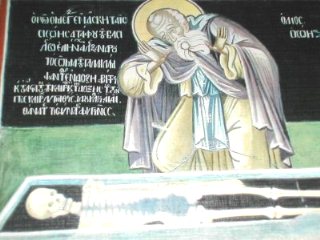 Fresco of Alexander the Great in the Monastery of Varlaam, Meteora, Greece. |
Hollywood sensationalizes Alexander’s public and personal life. The last movie produced was by Oliver Stone. His interpretation resulted in over forty lawsuits. Frank L. Holt, professor of History at the University of Houston, presents a factual interpretation in “Into the Land of Bones: Alexander the Great in Afghanistan”. Professor Holt’s research indicates the Alexander was “determined to manipulate his own mythology. Alexander was an effective and relentless censor throughout his career. He authorized a single official history of his reign and even killed the writer (Callisthenes) halfway through his campaign. Second, after Alexander’s death in 323 B.C.E., dozens of his compatriots took up their pens and papyrus to recount the hero’s deeds. People had axes to grind and the sparks give us only a flickering impression of the real Alexander at the center of these self-serving narratives. Ptolemy is a notable example. Ptolemy, the king of Egypt, established a dynasty that culminated …..in Cleopatra. Ptolemy’s memoirs further destroyed the events of his time……Not one of the sources survived……all far removed from the events and persons they describe. That is why the material evidence from archaeology and numismatics (coins) has proven essential to historians’ efforts.” |
|
A New York State judge of Greek roots from Macedonia, Greece believes “Alexander was a soldier first. We can not read contemporary values on the ancients. There are no primary sources describing his personal life, only secondary sources. Hollywood, whose aim is financial, has projected an inaccurate image of Alexander the Great.” Demetrios Estia of Astoria, who is an immigrant from Kastoria, Macedonia Greece, is living Alexander’s famous oath. “My wife, Sophia, is a Greek Orthodox convert from Korea,” he said. “Our two year old son, Stavros, is continuing my Greek heritage. We plan to enroll him in a Korean karate program so he can learn about his Korean heritage as well.” Demetrios Estia is Vice President of the Hermes chapter of AHEPA. |
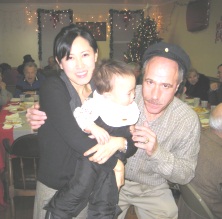 Sophia, Demetrios and baby Stavros Estia, following the Greek traditions of Macedonian Greeks at the Hermes chapter of AHEPA social in Astoria, New York. |
The Oath of Alexander states
Alexander the Great was a visionary. |
|
| Ambassador Zalmay Khalilzad was the speaker for the 2011 Sophocles and Louisa Zoullas Memorial Lecture. His topic was “Alexander the Great in Afghanistan”. The event was sponsored by Kimisis Tis Theotokou Greek Orthodox Church of the Hamptons at Parrish Hall of Southampton Hospital on Saturday evening, July 30th. The lecture moderator was Dr. Peter Mihalos. Nearly three hundred persons attended from the North and South Forks of the East End of Long Island. The lecture was free. Protopresbyter Alexander Karloutsos and Presbyter Constantine Lazarakis serve the community of Kimisis Tis Theotokou Greek Orthodox Church of Southampton, L.I. Demetrios Hatgistavrou is Parish Council President. “I was born at Mazari Sharif, in the center of Bactria (ancient Afghanistan),” said Ambassador Khalilzad. “He always tells me he has Greek DNA,” said Dr. Mihalos, the Ambassador’s personal friend. Moderator Dr. Mihalos has dedicated himself to making the 2011 Sophocles and Louisa Zoullas Memorial Lectures a success. His family is from Chios, ancient Ionia. The Asians’ first contact with Greece was from the Ionian Greek tribe in Asia Minor and bordering islands. Dr. Mihalos’ father, Ari, a retired businessman, inspires him in his projects. |
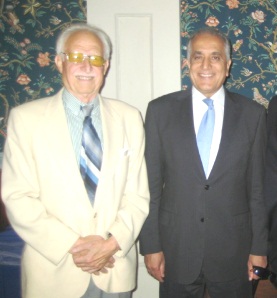 Ari Mihalos, father and main inspiration to moderator Dr. Peter Mihalos, with Ambassador Zalmay Mamozy Khalilzad. |
Michael Raounas believes “Alexander was the greatest military leader. He did not conquer. He Hellenized. Alexander was not like the Romans.” Paul Fagan, a friend of Nick Zoullas came with his wife Helene and children Duke and James, six and eight years old. “I personally knew Niko’s parents and were fond of them,” he said. Helene Fagan came with internet pages on Alexander. “I want my children to learn about Alexander the Great,” she explained. “The Greek influence can be seen in the giant Buddha statues that were blown apart by the Taliban,” said the Ambassador. The Buddhas, carved in the top of Afghanistan’s mountains, were created with the features of the Greek God Apollo. They were wearing Greek tunics. Hellenistic Art influenced this style and other creations. “Military technology makes a difference in initial encounter,” said the Ambassador. “Alexander won every battle, but lost the advantage by people who knew the terrain.” Historians believe when George W. Bush called the “first war of the 21st century”, that it began more than 2,300 years ago when Alexander the Great led his army into what is now Northern Afghanistan. Accounts of Alexander’s invasion of Bactria (ancient Afghanistan) sounds like our news today. Alexander led an army with the greatest technology of his day. His army was pushed to the limits of their endurance by the Afghan tribal leaders.” Col Andrew A. Lyons Jr. of the U.S. Reserve told me “that a fellow military commander said the lines of conflict in Afghanistan is exactly where Alexander the Great fought.” Ambassador Khalilzad had a power point presentation of a map of Afghanistan, showing the United States military position in the same area as Alexander. |
|
| The greatness of Alexander was in his personal example. Macedonian Kings, who spoke only Greek, led by example. They were at the front of their armies. Alexander the Great was the only battlefield commander in history, who stayed first in sight of an aggressive military leadership. He is imitated and admired by every subsequent commander. Alexander fought the Persians at close range with brilliant military tactics. Ambassador Khalizad explained “he conquered Persia (Iran), but needed to destroy opposition by the new King Bessus in Afghanistan. This was a threat to Alexander’s claim to the kingship of Persia. Alexander’s war was brutal.” |
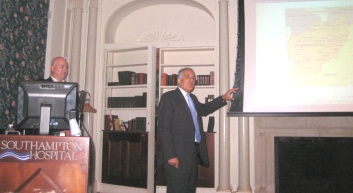 Ambassador Khalilzad power point presentation of a map of Afghanistan, with the assistance of Moderator Dr. Peter Mihalos. |
Historians explain that Alexander the Great, Britain, the Soviet Union and the U.S. all shared initial success. Not one superpower has found a workable alternative for the total conquest of Afghanistan. The British and Soviets retreated. Alexander’s strategy was to leave a large army of occupation permanently settled in the area. In August 2011, the U.S. is beginning its withdrawal from Afghanistan. Experts believe a force of 10% of the population can use the rugged terrain and hostile climate effectively against larger better armed forces. Ambassador Khalizad said the U.S. military is not encouraging the concept of socialization encouraged by Alexander the Great. “Alexander the Great wrote a letter to his Mother commenting on the military ability of Afghan leaders,” said the speaker. “Alexander wrote that Macedonia produced one Alexander. Every family has an Alexander. The Afghan leaders were fighting in defense of their families and possessions in the face of an overwhelming military force. The leaders took pride in their military skills, honor and independence as the Macedonians.” |
|
Ambassador Khalizad explained that “Alexander married Roxanne, an Afghan princess.” Scholars point out that the marriage brought Alexander into one of the prominent region clans. He could build a personal network of new royalties. “Alexander’s invasion of Afghanistan is different from that of the U.S.” he explained. “In fact one third of Darius’ army was composed of Greek mercenaries. He promised a massive resettlement.” Scholars believe Alexander drained off many of the young Bactrians (ancient Afghans) of fighting age into his army or held as hostages to guarantee the good behavior of their surviving families. Greek and Macedonian colonists settled. A brotherhood of mankind did not take place. The best way to envision the Greek colonies is to study the colonies in Sicily and Asia Minor. Alexander sent his general Ptolemy to subdue Eastern Afghanistan. Brutal suppression and heavy garrisons were left, during the Greek withdrawal. Alexander’s total war secured his hold of Afghanistan. |
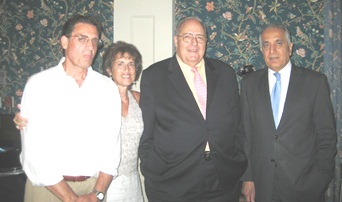 The writer with Demetrios Hatgistavrou, Kimisis Tis Theotokou Parish Council President (left to right), Nicholas Zoullas and Ambassador Zalmay Mamozy Khalilzad at the lecture. |
Scholars believe that those left behind remained in a state of war, turmoil, not peace and prosperity. Alexander did not have the manpower to garrison and rule. He gave back the land to the conquered rulers. Modern scholars have mixed views on the benefits of Alexander the Great and Hellenistic rule in ancient Afghanistan. “Alexander built an infrastructure similar to the U.S.’s effort today,” explained Ambassador Khalizad. “I view Alexander as courageous and extraordinary. His impact changed the known world. His brutal warfare in Afghanistan should not take away the greatness of the Hellenic leader.” Currently, new Hellenic forts and cities are being uncovered. In the Asian Museum of Kerkira (Corfu), there is an exhibit on the Greco-Bactrian Empire, established after the conquest of Alexander the Great. The exhibit states that “in 280 B.C., Greek kingdoms were created in the northern Punjab by Bactrian (Afghanistan) Greeks …..reaching as far as the Ganges Basin. Later on (100-80 B.C.) Menander took over the western valley of the Ganges and Gudjat and was taught the Buddhist faith. He founded the Greco-Indian Kingdom and used coins with bilingual inscriptions in Greek and Hindu script.” This was part of the Greek legacy in Afghanistan. Zalmay Mamozy Khalilzad was born on March 22, 1951. He is a counselor at the Center for Strategic and International Studies (CSIS) and president of Khalilzad Associates, an international business consulting firm based in Washington, DC. He was the United States Ambassador to the United Nations under President George W. Bush. He has been involved with U.S. policy makers at the White House, State Department and Pentagon since the mid-1980s, and was the highest-ranking Muslim American in the Administration of U.S. President George W. Bush. Khalilzad's previous assignments in the Administration include U.S. Ambassador to Afghanistan, U.S. Ambassador to Iraq and United States Permanent Representative to the United Nations. Demetrios Hatgistavrou, Kimisis Tis Theotokou Parish Council President said "Nick Zoullas created the lecture series in memory of his parents, Socrates and Louisa. The Zoullas’, who are now deceased, were philanthropists in Athens during the German occupation of WWII. They helped save their starving compatriots. They worked behind the scenes in their Southampton community, helping the hospital and Kimisis Tis Theotokou Church. Nick Zoullas sponsors lectures twice a year, during Lent and the summer." |
|
How did the 2011 Zoullas lecture on “Alexander the Great in Afghanistan” inspire this writer? I read Frank L. Holt’s masterpiece “In the Land of Bones: Alexander the Great in Afghanistan”. My Summer/Fall reading list includes “The Afghan Campaign” by Steven Pressfield. The Sophocles & Louisa Zoullas Memorial Hellenic Lectures bring outstanding persons to middle class America. I am personally honored to have met prominent persons such as Ambassador Khalilzad, because of the efforts of Nick Zoullas, assisted by Rev. Alexander Karloutsos and Lecture Moderator Dr. Peter Mihalos. Their unique cooperation must continue. Average Americans met probably one of the greatest Moslem American leaders in America. |
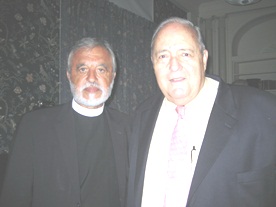 Rev. Alexander Karloutsos and Nicholas Zoullas, founders of the Sophocles and Louisa Zoullas Memorial Lecture. |
The Greek contribution in Asia should be explored in education circles. There is a wave of anti-Hellenism in the European Union. The 2011 Zoullas lecture uplifted Hellenism by presenting a unique feature of Alexander the Great’s conquest. He promoted and built Greek cities in Afghanistan that are now being discovered. Alexander the Great’s legacy is alive in the Greek language, an ancient language that was not wiped out as others. Persons of all backgrounds quote his views 2,300 year later. Our concept of a global society goes back to Alexander’s oath. Where Greeks go, they build society. They are remembered through the ages. Links: http://www.qsl.net/sv2ael/sv2ael.files/alexander/the_oath.htm- The oath of Alexander the Great, 324 B.C. http://en.m.wikipedia.org/wiki/Zalmay_Khalilzad biography of Zalmay Khalilzad http://www.suite101.com/content/origins-of-the-grecobactrian-kingdom-a167741#ixzz1SlCkLEQeAlexander in Afghanistan- Greco-Bactrian Kingdom. http://kimisishamptons.org/ Ambassador Khalilzad lecture. http://books.google.com/books?hl=en&lr=&id=NcmlHcl_B60C&oi=fnd&pg=PR7&dq=in+the+land+of+bones &ots=Q9gx4LAVD1&sig=MIUUDBViQ1qEDp0Zus9x2kN1XuU#v=onepage&q&f=false- Into the land of bones: Alexander the Great in Afghanistan by Frank Lee Holt. http://books.google.com/books?hl=en&lr=&id=mDz5njDcQZwC&oi=fnd&pg=PT285&dq=afghan+soldier+by+ steven+pressman&ots=ppi1Q93iVS&sig=qFJjSpQzh0zTBuBhlMuuQTKOj50#v=onepage&q&f=false- The Afghan Campaign by Steven Pressfield. http://www.wargamer.com/forums/tm.aspx?m=95986 -The Ancient Greeks in Afghanistan and Their Probable Descendants Today in Nuristan, Afghanistan and in the Kalash People, Pakistan. |
|
|
(Posting date 16 July 2012) Article originally submitted 8 August 2011. All photos courtesy of Catherine Tsounis. HCS encourages readers to view other fine articles (http://www.helleniccomserve.com/archivetsounis.html ) penned by Dr. Catherine Tsounis and press releases about the Modern Greek Studies program at St. John's University, where she is an adjunct professor. For more information about Dr. Tsounis, see her biographical sketch at http://www.helleniccomserve.com/biotsouniscatherine.html Browse our permanent, extensive archives at the URL http://www.helleniccomserve.com/contents.html. |
|
|
|
|
2000 © Hellenic Communication Service, L.L.C. All Rights Reserved.
http://www.HellenicComServe.com |
|
